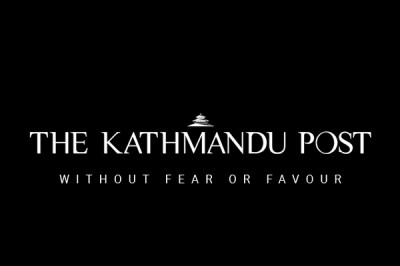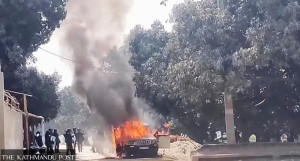Latest from Sandesh Ghimire
Life is elsewhere
By Sandesh Ghimire Most recent theatre scripts read like adolescent diaries. The play consequently unfolds like CCTV footage of a person’s life. “There is no artistic distillation of life,” Rajan Khatiwada, a veteran theatre actor and artistic director of Mandala Theatre, lamented in November last year, during an interview with the Post, “If I want a raw slice of life, I will go to Asan Bajar.”
The path well-trodden
By Sandesh Ghimire What is theatre’s role in society?” asks Sandeep Shrestha in the playbill of his new play Basudev, currently on stage at Kunja Theatre. His question echoes the sentiment found in most other playbills that are handed out before the show. Often implicit in such a line of questioning is the belief that theatre is supposed to make a valuable contribution to society. Are such questions mere rhetorical ploys? Can theatre truly contribute in society building?
Notes from khao san
By Sandesh Ghimire Khao San, one of the oldest streets in Bangkok, is—to a Nepali eye—an amplified version of Thamel. For a price, anything can be made available—from relaxing foot massages, helium gas highs, sultry hookers, deep fried scorpions and cockroaches to carefully manufactured sojourns to hamlets where bewildering traditions are kept alive for tourists. And as the moon climbs in the sky, the street turns into one big party with delirious dancing and drunken debauchery.
Part of the art
By Sandesh Ghimire Public display of affection is still frowned upon in Nepal and South Asia. Nepal Police still routinely harass couples enjoying their privacy in the quiet of hotel rooms, LGBT rights have been secured but sexuality is not yet open for public discussion. Chapters on human reproductive organs, as mandated by the government curriculum, are glossed over by teachers in schools, while sex education for young adults is either avoided or entirely dismissed by parents.
In search for justice
By Sandesh Ghimire In The Girl from Kathmandu, a decade long investigation reveals how Nepali youth are dispensable cogs in the global machinery
Flip the dam plan over
By Sandesh Ghimire Every year and in almost every grade, the government prescribed school curriculum makes students rote learn that Nepal has one of the biggest potential for hydropower development. Politicians, when in power cite hydropower expansion as Nepal’s short cut to heaven. A shroud of the promised land hung large when KP Oli and his Indian counterpart remotely laid the foundation to the 900 MW Arun 3 Hydro power project. In an recent op-ed article (Return of the Dam Plan, May 25), economist Chandan Sapkota lauded the restart of the project for its “transformative nature in terms of potential to boost economic growth and job creation.”— and took the opportunity to reflect on why the Arun 3 was stopped more than 20 years ago.
Travelling through time to arrive at today
By Sandesh Ghimire The Himalayan Arc: Journeys East of South-east brings together a collection of writings that explore modernity in the South Asian region. The onset of modernity in the region can be traced to Prithvi Narayan Shah, the founder of the first nation-state in South Asia, whose campaign to gobble “up tiny hill principalities and larger kingdoms in a military juggernaut” was partly successful, writes Amish Raj Mulmi in an essay featured in the book, because the Shah king had developed “a political ideal that allowed a people to pledge their allegiance to the modern abstraction of an amorphous, unchanging state.”
The eloquence of silence
By Sandesh Ghimire The Ugly Duckling turned out to be a misnomer. Bullied for being different, slow and clumsy compared to his siblings, the so-called ugly duckling struggled all his life to find love and acceptance. He wanted to fit in. And he almost broke himself trying. Only to later realise that he was not a duck but a Swan.
A gloomy classic comes alive
By Sandesh Ghimire In a span of two months, two separate adaptations of Anton Chekhov’s Three Sisters have been staged in Kathmandu’s theatres. The first one was the English adaptation, Three Sisters, staged at the Kunja Theatre in March, and there is an ongoing Nepali adaptation, titled Tin Bahini, at Shilpee Theatre, Battisputali.
Walking through the ages
By Sandesh Ghimire Amidst the ongoing outcries about the neglect or destruction of several heritage sites in the Capital and beyond, a new initiative is attempting to educate the younger generation on what is at stake if heritage sites get eviscerated.
Road to prosperity
By Sandesh Ghimire Why is Nepal adamant on adopting western-style development that has already resulted in colonialism and two world wars?
In search of political imagination
By Sandesh Ghimire Andheri Nagari Chaupat Raja, a play currently on stage at Kunja Theatre, brings forth a lucid adaptation of a popular Indian play. The fluidity of the musical comedy, achieved through a lyrical translation and live music meticulously synchronised with the action on stage, shows the creative strides made in adapting a play. Yet the play shows a narrow political imagination in its presentation.
The evidence of things not seen
By Sandesh Ghimire A necessary condition of life dictates that misfortunes do not occur singly,” writes Anthony Saunders, the leader of the six-member expedition team who attempted to climb the peak of Bojohagur in west Karakoram, Pakistan in 1984.
Scratching the surface
By Sandesh Ghimire In this decade of tenuous post-insurgency ‘peace’, several attempts have been made through literature, films, theatre and academic research to explore the impact of the ‘People’s War’ on Nepal. Given that a long period of time has not passed since the end of the war; given that the transitional justice issues have not been addressed and that the memories still linger fresh in the national psyche, there is no definitive view on how the civil war shaped the fabric of Nepali society. No doubt, eventually, a definitive narrative will emerge; but in the meantime, productions like Sakhi, for better or worse, will continue to add and shape perspectives.
Memory, Mistress of Mistresses
By Sandesh Ghimire Do you remember the cool ‘back-benchers’ who had the guts to flirt with girls and openly make fun of the teachers? Well, I do because I was one of them. Or was I really?




 16.88°C Kathmandu
16.88°C Kathmandu
























